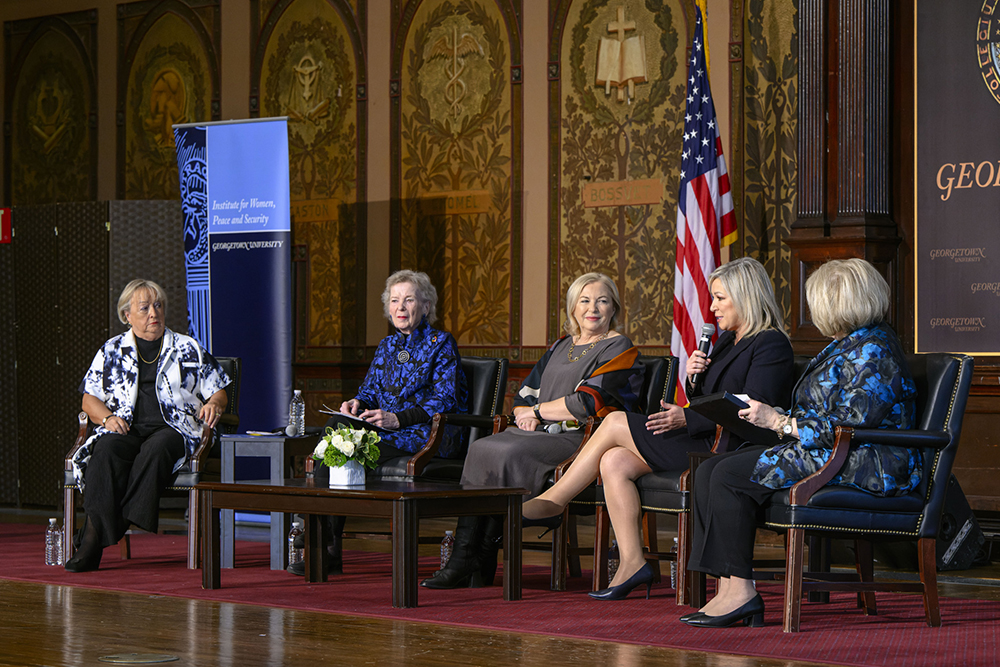
Michelle O'Neill, the first minister-elect of Northern Ireland and deputy leader of Sinn Féin, speaks as part of a March 16 panel on the role of women in the 1998 Good Friday Agreement in Northern Ireland. The panel, held at Georgetown University in Washington, D.C., also included, from left, Monica McWilliams, a signatory to the Good Friday Agreement; Mary Robinson, former president of Ireland; Liz O'Donnell, former minister of state of Ireland; and Melanne Verveer, executive director of the Georgetown Institute for Women, Peace and Security. (Courtesy of Georgetown University/Phil Humnicky)
One of the rewards of covering the work of sisters is having the chance to step back occasionally and reflect on both the progress women have made worldwide and the ongoing challenges they face.
Since I like to accentuate the positive, let me begin with a kind of affirmation: A recent event at Georgetown University recognized the important role women played in the 1998 Good Friday Agreement — 25 years old this spring — which ended decades of sectarian violence between Roman Catholic nationalists and Protestant unionists in troubled Northern Ireland.
"Northern Ireland has been an example of inclusive peace-building to the world," said Melanne Verveer, who heads the Georgetown Institute for Women, Peace and Security. The institute sponsored the March 16 event, "Women at the Helm: The Unfinished Business of Northern Ireland's Good Friday Agreement."
Among those hailing women's grassroots roles in the agreement were two political leaders, one currently in office and the other a respected veteran: Leo Varadkar, Ireland's prime minister (or, as the Irish call the position, "taoiseach"), and Hillary Rodham Clinton, former U.S. secretary of state, first lady and U.S. senator from New York.
Both spoke of the behind-the-scenes work by female Catholic and Protestant activists in laying the groundwork for the agreement, which still holds despite challenges and questions about the future of Northern Ireland, like whether it will remain in the United Kingdom or eventually become part of greater Ireland.
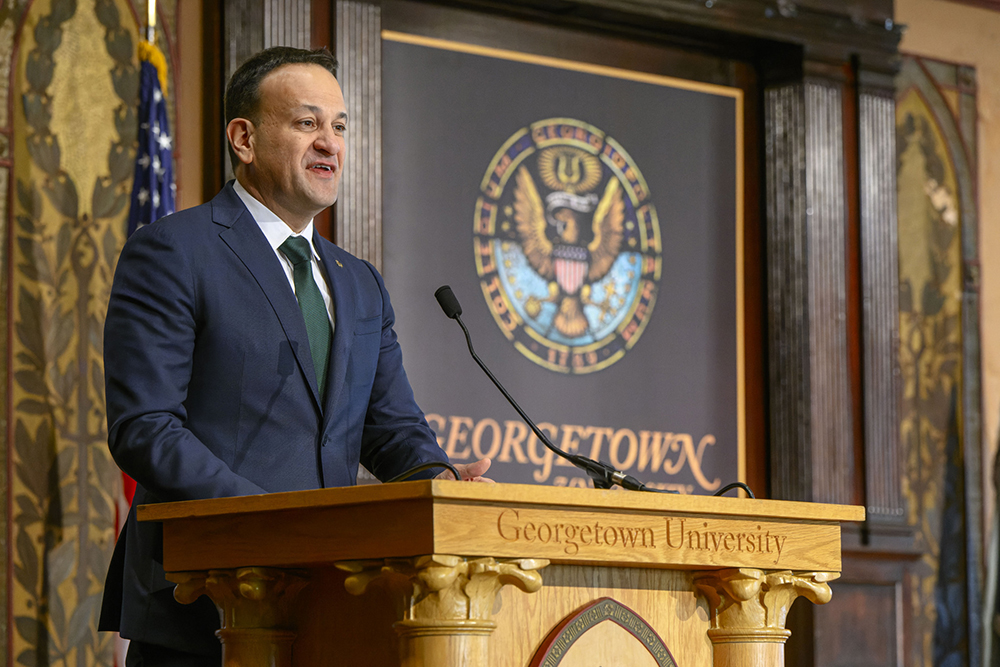
Leo Varadkar, prime minister of Ireland, speaks during a March 16 event sponsored by Georgetown University's Institute for Women, Peace and Security in Washington, D.C. In his remarks, Varadkar praised the role of women in the 1998 Good Friday Agreement in Northern Ireland. (Courtesy of Georgetown University/Phil Humnicky)
Varadkar hailed the work of female activists and noted that it was women, particularly the small political party Northern Ireland Women's Coalition, who made sure that concerns important to women — like reconciliation, mixed Catholic and Protestant housing and the rights of survivors of violence — became part of the agreement.
How that happened was instructive about the importance of political organizing.
The existing political parties didn't even respond to queries about whether women would be at the negotiating table, said Northern Ireland activist Monica McWilliams, one of the Georgetown event's speakers.
"We were told to go home and breed and to be proper housewives," she said.
So the women decided to act on their own.
"Twenty-five years ago, we took a risk," McWilliams said, recalling that the coalition, running as a political party, won two assembly seats, allowing it to claim a place at the negotiating table. (The party dissolved in 2006.)
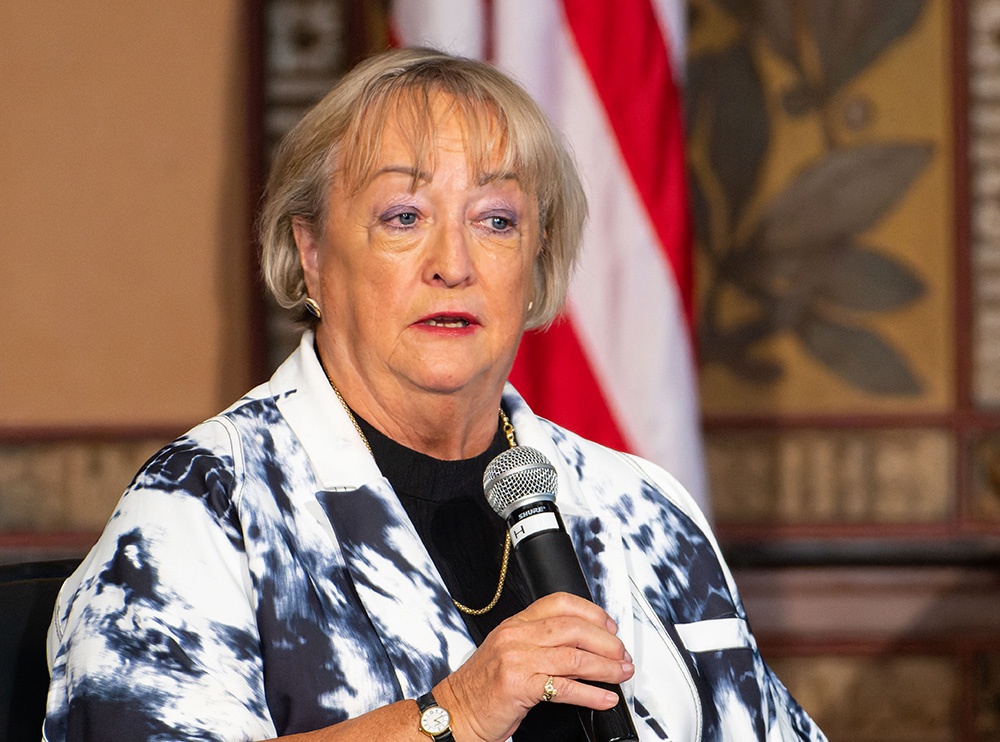
Monica McWilliams, a signatory to the Good Friday Agreement, speaks at a March 16 event sponsored by Georgetown University's Institute for Women, Peace and Security in Washington, D.C. (Courtesy of Georgetown University/Phil Humnicky)
The result? A quarter-century later, the agreement "shines as a beacon of hope and an example to all of us in politics and outside of politics that the impossible can be achieved when people work together," Varadkar said. "Women picked up the pieces when things fell apart."
A key point that the prime minister made stuck out for me: "Women from across the political spectrum were able to contribute to everything that happened except, it seems, the photographs at the end," he said, adding, "We can have no meaningful commemoration of the Good Friday Agreement unless the role of women is properly recognized and applauded."
It's hard to imagine that some women would not be in those photographs today. Four women now serve in the current Irish cabinet — a record, though still not enough given male dominance in the Irish Parliament. (Two women have also served as president of Ireland, one of whom, Mary Robinson, also spoke at the Georgetown event and said, "We have to think about how to sustain more women in elected office.")
Meanwhile, women account for one-third of the 90 seats of the Northern Ireland Assembly — a better percentage than female representation in the U.S. Congress, which is now 28% — but still the lowest proportion in the various assemblies in the United Kingdom.
Advertisement
Could the agreement come about today? In praising the "behind-the-scenes" work of women, Clinton noted the importance of quiet relationship-building, something that might be harder to replicate today given a social-media-driven environment in which political opponents are demonized.
"It took a lot of courage to begin to sit and talk to people who you thought had, if not contributed [to], certainly condoned violence and disruption," said Clinton, who visited Northern Ireland as first lady and met with female activists.
"But you do not make peace with your friends; you do not negotiate with people you already agree with. We all have to do some serious soul-searching about how we relate to one another in this much more complicated information environment where demonization and scapegoating are accepted strategies."
Living in a decent society means seeing beyond self-interest, Clinton said, to affirm workable solutions for the betterment of all.
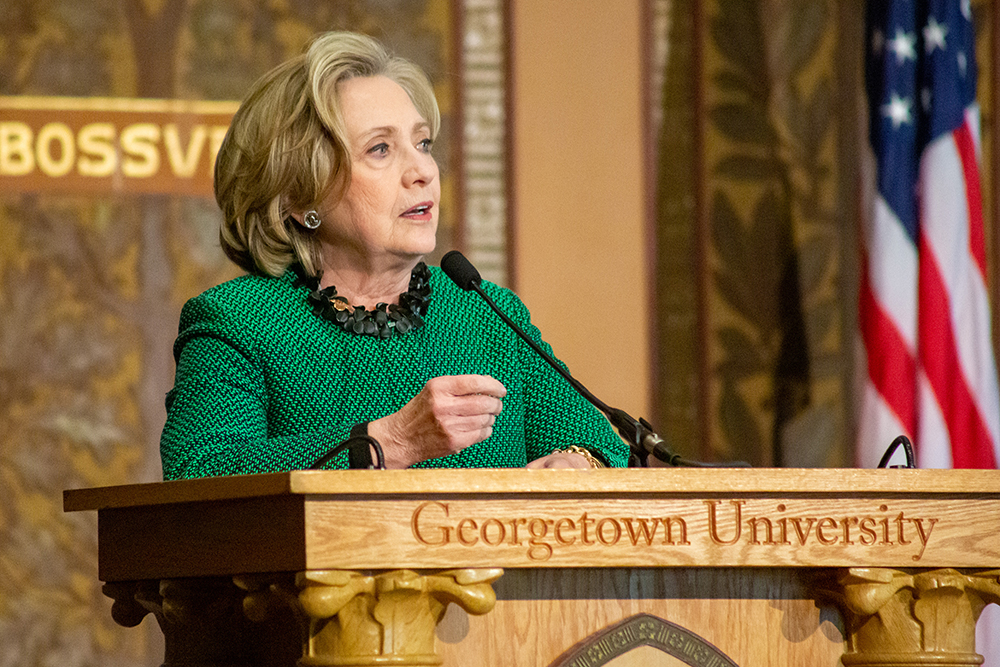
Former U.S. Secretary of State Hillary Rodham Clinton speaks at a March 16 event at Georgetown University that recognized the role of women in the 1998 Good Friday Agreement in Northern Ireland. (Courtesy of Georgetown University/Phil Humnicky)
That certainly aligns with my global reporting experiences. In places like South Sudan, for example, women are far more likely than men, I think, to see that broader picture and get beyond political posturing — or worse. (I don't want to psychoanalyze Russian President Vladimir Putin or minimize the cold calculus of geopolitics, but it's hard not to see toxic masculinity as part of the reason for the Russian invasion of Ukraine.)
Of course, the broader picture is often complicated — and sobering.
During the recent meetings of the United Nations' Commission on the Status of Women, UN Women Executive Director Sima Bahous spoke to the U.N. Security Council about U.N. Resolution 1325, which the United Nations adopted in 2000.
The resolution affirms the role of women "in the prevention and resolution of conflicts, peace negotiations, peace-building, peacekeeping, humanitarian response and in post-conflict reconstruction and stresses the importance of their equal participation and full involvement in all efforts for the maintenance and promotion of peace and security," the United Nations notes.
More than 20 years later, disappointment hovers over the resolution.
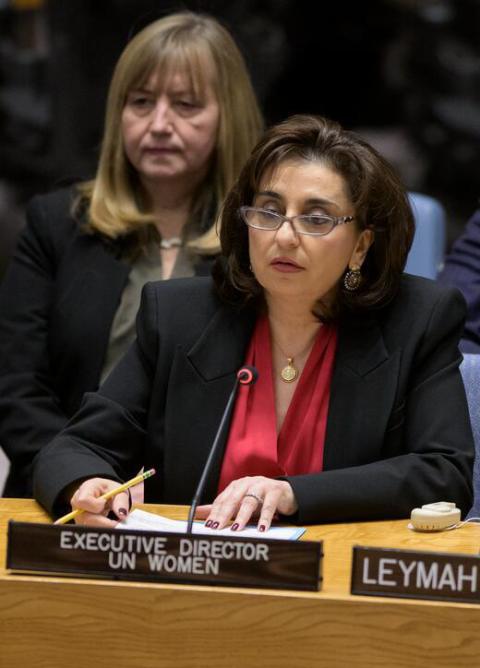
Sima Bahous, executive director of UN Women, speaks March 7 to the U.N. Security Council about U.N. Resolution 1325. (UN/Manuel Elías)
"We have neither significantly changed the composition of peace tables, nor the impunity enjoyed by those who commit atrocities against women and girls," Bahous said in her March 7 remarks, citing numerous examples of "regression" for women and girls, including the current situation in Afghanistan, where the ruling Taliban have steadily enacted oppressive measures and restrictions against women.
Bahous noted that during the 20th anniversary of Resolution 1325 in 2020, female activists warned "that the effects of ignoring our own commitments to women, peace and security would be long-lasting and intergenerational for women, and immediate and drastic for world peace."
Those warnings have largely gone unheeded.
Longtime peace activist Sr. Kathleen Kanet, a member of the Religious of the Sacred Heart of Mary who attended the Security Council meeting where Bahous spoke, said this is dismaying.
"After 20 years, women are not sitting at the peace table after conflicts and wars stop," Kanet told me. "And neither has the impunity enjoyed by those who commit atrocities in war and conflict against women been addressed."
"We have far, far to go," she said.
We do. But events like the Commission on the Status of Women and the Georgetown conference show there is a critical mass of people who take these concerns — and the concerns of women generally — seriously.
In the past, McWilliams said, "we would have been somewhere in the back, looking on."
Thankfully, women took center stage at the Georgetown meeting, though as the conference's title noted, there is much unfinished business at hand when it comes to women's rights.
As Verveer said in her opening remarks: "The journey has never ended."







